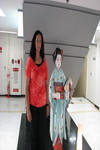Day 1 :
Keynote Forum
George S Everly
Johns Hopkins University
Keynote: Five factors of human resilience
Time : 10:00-10:30

Biography:
George S. Everly, Jr., PhD, ABPP is an award-winning author and researcher. He holds faculty appointments at the Johns Hopkins University and at Loyola University in Maryland. He has served on the adjunct faculty of the Federal Emergency Management Agency and the FBI’s National Academy at Quantico, Virginia. Dr. Everly holds Honorary Professorships at the Universidad de Flores, Buenos Aires, Argentina and Universidad de Weiner, Lima, Peru. He was an advisor to the Hospital Authority of Hong Kong. Dr. Everly is co-founder of the International Critical Incident Stress Foundation, a non-profit United Nations-affiliated public health and safety organization. He was formerly Distinguished Visiting Professor, Universidad de Flores (Argentina), and was Senior Research Advisor, Social Development Office, Office of His Highness, the Amir of Kuwait, State of Kuwait. Prior to these appointments Dr Everly was Chief Psychologist and Director of Behavioral Medicine for the Johns Hopkins\\\\\\\' Homewood Hospital Center. He is the author, co-author, or editor of 20 textbooks and over 100 professional papers. Among his texts are Fostering Human Resilience (Chevron, 2013), The Resilient Leader (DiaMedica, 2010), The Resilient Child (DiaMedica, 2009, Gold Medal Winner), Integrative Crisis Intervention and Disaster Mental Health (Chevron, 2008), and Mental Health Aspects of Disasters: Public Health Preparedness and Response (Johns Hopkins, 2005).
Abstract:
Based upon 30 years of research and observation of human resilience, we conclude that there are five core elements which serve to create a personal culture of resilience. In this presentation, Dr. Everly will discuss his finding and highlight those findings with excerpts of interviews from cases which serve to exemplify each of the five factors. These interviews were conducted with people showing extraordinary resilience in the wake of terrorist bombings, assassination attempts, child abuse, remarkable achievements in athletics, catastrophic physical injury, and covert military operations. The putative factors of human resilience are shown to be learned factors and therefore capable of being taught to almost anyone at almost any age. Professor Everly will discuss how these same factors may be used in the workforce, athletics, academics, and even the performing arts as a competitive advantage.
Keynote Forum
Heidi L Maston
Fielding Graduate University, USA
Keynote: I’m not dead yetâ€: And other reasons why I get up in the morning
Time : 10:30-11:00

Biography:
Heidi L Maston is an internationally recognized distributed education and communications expert with a strong history and solid reputation for innovative leadership, integrity based outcomes, and an unprecedented ability to meet people where they are and champion their way to their desired outcomes. She draws on her vast professional and personal experiences in her duties as a Keynote Speaker, Presenter, Researcher, Author, Coach, Instructor, Graduate Program Developer, Course Designer, and Consultant. She is a strategic visionary who has combined 25+ years of experience in social service and education to create a strong worldview of cultural diversity enhanced with compassion, tangible achievement, and a comprehensive understanding of the issues in today\\\\\\\'s teaching, training, and personal development environments.
Abstract:
Resilience should not be personalized, except when it is. When an individual faces an obstacle, the natural inclination is to resist the force of change that is being exerted against their status quo of emotional fortitude. In other words, they dig their heels in deeper and refuse to budge. Regardless of the obvious benefits of bending, accepting, or simply acknowledging change, most people are strongly resistant to doing so. That begs the question, “Why?†Experience answers it simply, “As frightening as the current situation may be, the unknown could be worse.†By fear and default, people choose to stay stuck and the personal, societal, educational, and community impacts are horrendous. What would happen to our systems if we enabled individuals to recognize, channel, and utilize their inner wells of personal resilience? How would a well equipped population behave, engage, and expand business, communities and educational systems if every member was privy to the protection of their own “Personal Armor†that allowed them to become resilient against the fear of intra-personal retaliation? The potential for change is unlimited. In this humorous address, she weaves a 25 year professional career in social services, education, leadership, and psychology with a lifetime of personal (often traumatic) events. Her recognition and development of her own “Personal Armor†has propelled her to break free of the chains of internal resistance. Motivated simply as a “Helperâ€, she has developed a research and real world based teaching, coaching, and counseling strategy that identifies an individual’s strengths, fears, and internal dialogues. Her goal is simple: To empower individuals with a shiny set of “Personal Armor†to face each challenge with humor, grace, dignity, and peace.
- 1. Positive Psychology 2. Theory of human resilience 3. Building resilience to promote sustainab 6. Resilience and abilityility
Location: Riviera, Embassy Suites, Las Vegas
Chair
Karen Wolford
SUNY Oswego, USA
Co-Chair
Tina Balachandran
Qatar Airways Medical Center, Qatar
Session Introduction
Antonio Pangallo
City University London, UK
Title: What do we mean by resilience? Exploring the construct of resilience through self-report measures
Time : 14:00-14:25

Biography:
Antonio Pangallo, PhD, is a lecturer in organisational psychology at City University London and is a Chartered Occupational Psychologist in the UK. He has worked predominately in the learning and development domain in a wide range of roles across private and public sectors. Antonio has spent considerable time working on a number of projects for International Non-Governmental Organisations including the United Nations Office on Drugs and Crime, Medical Emergency Relief International, and Catholic Agency for Overseas Development. Antonio is a reviewer for the journal Psychological Assessment and has research interests in the field of psychometrics and employee resilience. In particular, Antonio has explored new approaches to the measurement of resilience in human service workers. His most recent research in the palliative care sector resulted in a novel measure of resilience designed to identify those at risk of burnout and stress related illness.
Abstract:
There is considerable disparity in the way resilience is operationalized (e.g. trait, process, outcome) which has highlighted the need for clarity with respect to definition and measurement. The two studies that will be presented attempt to synthesize current thinking around the operationalization and measurement of resilience. The first study presents findings from a systematic review, which includes a content and methodological review of resilience measures. The second study presents findings from an exploratory factor analysis designed to explore how resilience is currently being operationalized by existing scale authors. Findings suggest that the majority of resilience measures are operationalized in very different ways resulting in an eight-factor model of resilience. Implications of this study are that many measures of resilience adequately capture trait resilience but do not assess the interactive elements of a person and their environment. Thus, there is a real need to develop multi-modal assessment methods to overcome the limitations associated with measuring resilience as a global entity.
Tina Balachandran
Qatar Airways Medical Center, Qatar
Title: Psychosocial Initiatives to Foster Resilience at Work – an organizational approach
Time : 14:25-14:50

Biography:
Tina is a licensed Clinical Psychologist in the State of Qatar and an Aviation Psychologist. As the Senior Company Psychologist for Qatar Airways, she is actively involved in various psychosocial support initiatives and writes articles for the in-house Flight Safety Bulletin. In addition to psychotherapy, she facilitates de-briefings and psychological support following any incident. She trains employees to provide support in the event of any disaster, and was recently involved in the initiation of a peer support program. She is a member of various international organizations and has been a member of the SIOP conference program committee since 2008. She is currently pursuing her Psy.D from California Southern University.
Abstract:
The impact of stress on human performance is a much talked about and well-researched subject. In aviation, the psychological and emotional impact of stress cannot be ignored, as it is an operational concern for managers and the organization at large. The sources of stress in an aviation environment are unique in many ways. Aviators and cabin crew could be living away from their family; they may deal with technical or medical emergencies on board. They also deal with personal life situations like death in the family, financial issues, sickness, and relationship issues. This could lead to mental health concerns related to depression, anxiety, and adjustment issues. The stress and trauma in the aftermath of an air disaster cannot be ignored. Aviation personnel involved in such critical incidents and other employees within the organization could develop Acute Stress Disorder or Post Traumatic Stress Disorder (PTSD). Failure to address these symptoms of distress and psychological issues could lead to increased sickness, decreased psychological well-being, counterproductive work behaviors, and safety related issues. The organization has initiated processes such as psychological fitness for duty evaluations, psychological first aid and psychosocial support training, peer support, critical incident stress de-briefing (CISD), and psychotherapy. These initiatives assist in building resilience among employees and facilitate faster return to work.

Biography:
Study 1: Many previous studies have confirmed that psychological resilience is closely related to self-control capacity (emotional regulation, perseverance, positivity) as well as relational capacity (sense of relatedness, empathy and communication competence). In short, to be resilient one should be able to control oneself and keep good relations with others. We developed scales for measuring resilience, and tested the items with the two independent groups collected from nationwide surveys: Group 1 (N=724, age=42.81±12.98, male=49.6%) and Group 2 (N=928, age=29.69±5.48, male=48.6%). Using a series of confirmatory factor analyses, we identified the 67 items, and then tested the scale with other two independent groups: Group 3 (N=785, age=42.77±12.97, male=49.8%) and Group 4 (N=961, age=27.13±4.37, male=48.4%). Study 2: Using the 67-item resilience scale, the authors examined resilience of the employees of two large companies (age=40.32±5.23, male=82.1%) and the adolescents (N=424, age=16.90±1.19, male=48.6%) at the high schools. As expected, those who showed higher resilience performed better at the work and at the school. Study 3: The authors trained 10th grade students (N=315) at a high school with the mental muscle enhancing program, or the GRIT training program, for two months. The positive effects of the training on the levels of resilience were found.
Abstract:
Joohan Kim (PhD in communication, University of Pennsylvania, 1997) had been teaching at Boston College as a tenure-track Assistant Professor until 1999, when he moved to Yonsei University in Seoul. He has published numerous research papers and books, including Resilience in 2011, a bestseller in South Korea. His research is currently focusing on the physiological bases of resilience and communication competence with HRV, EEG and fMRI. He has developed the scales for measuring resilience and the training programs for enhancing resilience, self-control, emotional regulation, and communication competence.
Karen Wolford and Arthur Delsing
SUNY Oswego, USA
Title: iCorps Mobile App for Stress Reduction: Development and Lessons Learned
Time : 15:15-15:40

Biography:
Karen Wolford earned her PhD in clinical psychology from Oklahoma State University. She has been a faculty member in the Psychology Department at SUNY Oswego since 1988. She is currently the Coordinator of the Interdisciplinary Graduate Certificate in Trauma Studies since 2012. Arthur Delsing is a graduate student in the Human Computer Interaction masters program at SUNY Oswego. This presentation is based on research funded by the National Science Foundation, ICorps program.
Abstract:
Mindfulness Based Stress Reduction (MBSR) has been shown to be effective as a transtherapeutic adjunctive approach for depression, anxiety, stress and chronic pain. An online, 6-week MBSR intervention with Veterans, shows that mindfulness can be successfully established in those with PTS symptoms (Dessa Bergen-Cico, et. al., 2015). PTSD, which is now referred to as a Trauma and Stressor Related Disorder in DSM 5, 2013, is frequently comorbid with depression as are other anxiety disorders (NIMH, 2014). iCorps presents an opportunity to explore translation of this research to development of a useful product via dedicated business training and customer discovery efforts. The goal to develop a mobile app that is flexible and can address more than just PTSD seems important. The app plans to address many aspects of empirical MBSR research. Since adherence is necessary to establish Mindfulness, adding incentives for completion of tasks would enhance motivation (badges, positive affirmations, etc.). Social support is also key in recovery from traumatic stress (Dass-Brailsford, 2007), therefore helping users suffering from trauma find a way to create their support network may be a key factor in such an app. Lastly including service links to suicide prevention is recommended. Possible expansion of this app to other populations continues to be explored.
- 4: Resilience and the Individual/Family 5: Building Resilience to Promote Sustainability 7: Individual and their Adaptation
Location: Riviera

Chair
Joo Im Quah-Smith
Roseville Wellness Group, Australia
Session Introduction
Keng Shian Ling
National University of Singapore, Singapore
Title: The role of mindfulness in promoting human resilience
Biography:
Shian-Ling Keng is an Assistant Professor from the Department of Psychology at the National University of Singapore. She obtained her PhD in Clinical Psychology from Duke University, North Carolina, USA. She has published in the areas of mindfulness-based interventions and emotion regulation. Her research interests include: Efficacy of change of mindfulness-based interventions, emotion regulation, and dissemination of empirically supported interventions in Southeast Asia. She is also a Clinical Psychologist who has worked with patients of a variety of diagnoses. She aspires to help improve the quality and accessibility of mental health services through teaching, research, community outreach and advocacy.
Abstract:
Mindfulness can be defined as the process through which one pays attention to experiences in the present moment in an intentional, open, and nonjudgmental manner. In recent years, there has been a significant increase of interest in researching and understanding the application and psychological effects of mindfulness meditation and mindfulness-based interventions. These interventions, which include standardized programs such as mindfulness-based stress reduction (MBSR), mindfulness-based cognitive therapy (MBCT), dialectical behavior therapy (DBT), and acceptance and commitment therapy (ACT), have been proposed to be representative of a “third wave†of psychological interventions. Much research has examined and demonstrated the benefits of these interventions on various domains of human functioning, ranging from enhanced cognitive abilities, improved attentional functioning, reduced psychological symptoms such as depression and anxiety, improved well-being, and greater psychological resilience. Research has also demonstrated various psychological and neurobiological mechanisms through which mindfulness may lead to improved psychological functioning. This talk will integrate state-of-the-art findings from studies from various disciplines, including clinical psychology, psychiatry, educational psychology, and organizational psychology, that highlight various ways through which mindfulness promotes human resilience. The talk will also include an experiential exercise, during which the audience will be invited to engage in a brief, guided mindfulness practice to gain an experiential understanding of mindfulness

Biography:
Dr. Michal Finklestein is currently working in Zefat Academic College, Israel and carrying research work in the areas of PTSD and trauma.
Abstract:
The current study investigates posttraumatic stress disorder (PTSD) and vicarious trauma (VT) symptoms among mental health professionals (MHPs) working in communities exposed to high levels of trauma related to rocket attacks from the Gaza Strip. The study assessed direct and vicarious traumatic exposure. The study also explored the relationship between resilience and posttraumatic growth (PTG) with MHPs’ PTSD and VT symptoms. Results indicate that MHPs working in the more severely affected community of Sderot report higher objective, subjective and professional exposure as well as higher levels of PTSD and VT symptoms, compared to MHPs working in some of the other Gaza-bordering communities. Resilience had no relations with PTSD and VT in the less severely affected community of Ashdod. However, resilience had protective relations with PTSD and less in VT, in the more severely affected community of Sderot. The relation between resilience and PTG was positive in MHPs of the more severely affected community of Sderot, while negative in MHPs of the les severely affected community of Ashdod. The findings indicate that MHPs exposed to concurrent primary and vicarious trauma are at increased risk for psychological distress. However, resilience became a protective factor only in the more severely affected communities. Conclusions were drawn about interventions that aim to increase professional support; that may buffer the effects of concurrent primary and vicarious trauma exposure.

Biography:
Dr Im Quah-Smith works in wellness and is a strong supporter of preventative medicine and facilitating the individual to achieve higher emotional and physical resilience. Her doctoral body of work was on the biological and clinical evidence base for laser acupuncture in depression. She is involved in international acupuncture research projects and mind-body medicine. She regularly reviews for international peer reviewed journals and is on the editorial committees for Medical Acupuncture and Acupuncture and Related Therapies.
Abstract:
Over the last 40 years, acupuncture intervention has been synonymous with pain management in clinical care as the scientific evidence base revealed its neurophysiological basis. Acupuncture modalities being investigated also expanded from needle puncture to needle free low intensity therapeutic laser application on both body and ear acupuncture points. With the advent of neuroimaging in acupuncture research, in particular functional magnetic resonance imaging, the central mechanisms (brain effects) of acupuncture have been better understood. Its modulation of brain information flow efficiency and the maintenance of the individual’s sense of self at the medial frontal gyrus are contributory to the positive effect on emotional resilience. This paper presents the fMRI evidence and clinical evidence for acupuncture’s place in increasing emotional resilience.
Liat Korn
Ariel University, Israel
Title: Post-Traumatic stress and world assumptions – The effects of religious coping

Biography:
Dr. Liat Korn is a senior researcher and lecturer in the field of Medical Sociology. Her doctoral thesis (2005) was on “Water Pipe Smoking among Teen-agers in Israel: A sociological Analysis†from Bar-Ilan University, Israel. In her post-doc she studied and conducted the Israeli HBSC (Health Behavior of School-aged Children) and HBSC-ME (HBSC in the Middle East). She published more than 20 papers in reputed journals and conducted several studies including risk behaviors among teenagers and young adults in Israel. She offers courses and seminars in Sociology; Medical Sociology, Epidemiology, Health Promotion and Risk Behavior.
Abstract:
Religiosity has been shown to moderate the negative effects of traumatic event experiences. The current study was deigned to examine the relationship between Post Traumatic Stress (PTS) following traumatic event exposure; world assumptions- defined as basic cognitive schemas regarding the world; and self and religious coping- conceptualized as drawing on religious beliefs and practices for understanding and dealing with life stressors. This study examined 777 Israeli undergraduate students who completed several questionnaires which sampled individual world assumptions and religious coping in addition to measuring PTS, as manifested by the PTSD Check List (PCL). Results indicate that positive religious coping was significantly associated with more positive world assumptions, while negative religious coping was significantly associated with more negative world assumptions. Additionally, negative world assumptions were significantly associated with more avoidance symptoms, while reporting higher rates of traumatic event exposure was significantly associated with more hyper-arousal. These findings suggest that religious related cognitive schemas directly effect world assumptions by creating protective shields that may prevent the negative effects of confronting an extreme negative experience.





